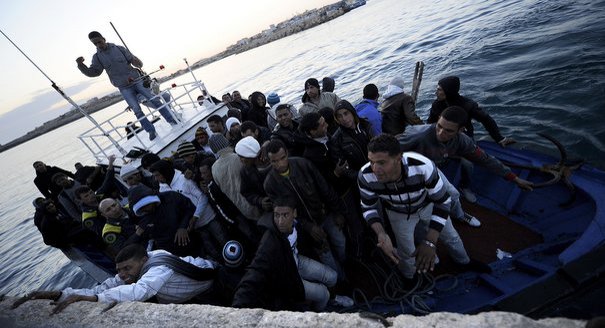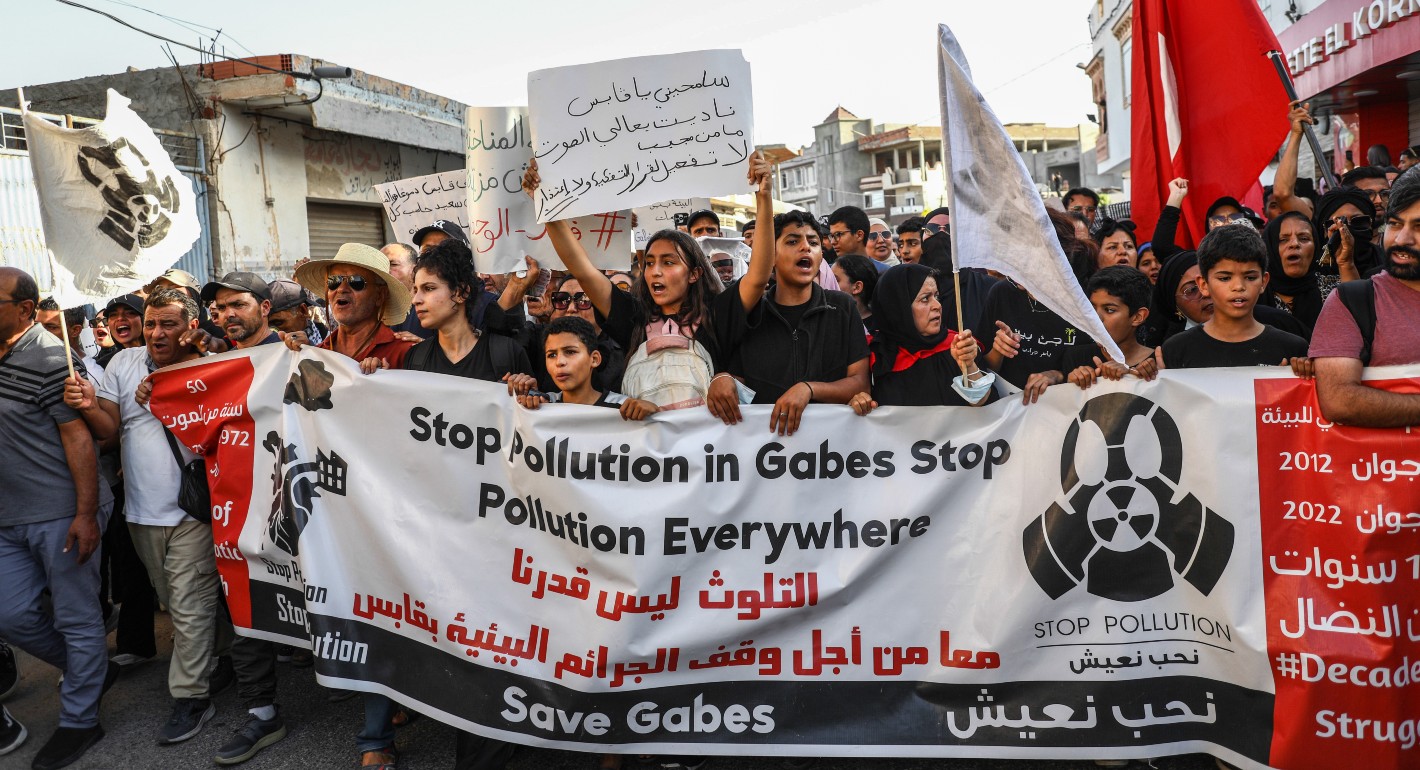Jon Bateman, Steve Feldstein
{
"authors": [
"Steve Feldstein"
],
"type": "legacyinthemedia",
"centerAffiliationAll": "dc",
"centers": [
"Carnegie Endowment for International Peace",
"Malcolm H. Kerr Carnegie Middle East Center"
],
"collections": [],
"englishNewsletterAll": "",
"nonEnglishNewsletterAll": "",
"primaryCenter": "Carnegie Endowment for International Peace",
"programAffiliation": "DCG",
"programs": [
"Democracy, Conflict, and Governance"
],
"projects": [],
"regions": [
"North Africa",
"Libya",
"Western Europe"
],
"topics": [
"Political Reform",
"Security"
]
}
Source: Getty
Moral Failure in Libya
Europe remains at fault for both failing to rebuild Libya following its 2011 intervention, and for increasingly relying on rights-abusing militias for its coast guard and migrant interdiction responsibilities.
Source: Oxford Monitor of Forced Migration
This essay examines the roots to the Libyan migration crisis and European culpability for documented human rights abuses. It argues that failed efforts to rebuild Libya following the 2011 humanitarian intervention combined with recent European policies to outsource responsibility for the migration crisis to Libya have created a perfect storm of exploitation, predation, and abuse.
The Situation
In early November, CNN broadcast shocking footage of dozens of migrants being sold in slave auctions in Libya (Elbagir et al. 2017). The video shows groups of migrants detained in cells or flanked by unknown men, as an auctioneer operating in a floodlit courtyard provides opening bids for the right to purchase another human being. He starts at $400, then goes up to $500, then $600. Finally, the bidding stops at $800 and a young man is sold to an undisclosed buyer. This appalling report may have finally spurred the international community to address gross human rights violations in Libya. Soon after, France called a special session of the UN Security Council where it pressed for international prosecutions and sanctions of the traffickers responsible for the auctions (Besheer 2017). Likewise, UN Secretary-General Antonio Guterres expressed his public horror of the footage and warned that this may constitute “crimes against humanity” (Independent 2017).
Slave auctions represent a dreadful new low for a situation that long ago ceased to shock. These violations are an inevitable outcome of a set of failed policies that have recklessly imperilled the lives of thousands of migrants, possibly in contravention of international law. Human rights groups have been sounding the alarm and documenting atrocious conditions for migrants in Libya for several years.
For example, Amnesty International reported in 2016 that migrants were being subjected to “sexual violence, killings, torture and religious persecution” by smugglers, traffickers, criminal gangs and armed militias in Libya (Amnesty International 2016). The UN Panel of Experts documented in its June 2017 report widespread abuses against migrants that included “executions, torture, and deprivation of food, water and access to sanitation” (Spittaels et al. 2017). German diplomats have gone so far as to describe Libyan facilities as “similar to concentration camps” (Der Spiegel 2017). International authorities estimate that between 400,000 and one million migrants are currently trapped in Libya (Tharoor 2017). This means that not only are some of the most egregious human rights atrocities in the world taking place on Europe’s doorstep, but they are affecting hundreds of thousands of people.
Europe’s treatment of the Libyan migration crisis represents a moral failure for several reasons. First, the roots of the current crisis are attributable to decisions taken by European and U.S. NATO coalition leaders in 2011, when the alliance deposed Libyan president Muammar Gaddafi without any real plan for the day after. While migration was a significant concern even before 2011, averaging 80,000 annually during Gaddafi’s later years, the post-2011 numbers are extraordinarily higher (Hamood 2008). As the international community painfully learned (yet again), undertaking an armed intervention in a country devoid of political institutions and seething with inter-communal conflict often leads to bad outcomes. Unsurprisingly, Libya sank into civil war and became a breeding ground for instability and terrorism. Professor Alan Kuperman (2015) observes: “Libya has not only failed to evolve into a democracy; it has devolved into a failed state. Violent deaths and other human rights abuses have increased severalfold”.
While there were putative attempts by the international community to help rebuild the country and establish the basic workings of a functional government, these efforts suffered from a lack of leadership, resources, and willpower. For example, Europe’s commitment proved inadequate with leaders like French president Nicholas Sarkozy and British prime minister David Cameron soon “distracted, by relation campaigns and economic worries” (Shane and Becker 2016). It was not until 2013 that NATO sent a small advisory team to Libya to advise on “defense institution building” (North Atlantic Treaty Organization 2013). The UN continued to maintain a limited political advisory mission; the Security Council chose not to authorize a formal peacekeeping mission. Meanwhile, the interim Libyan government passed a disastrous political isolation law and implemented an ineffectual electoral arrangement that “exacerbated tribal and regional divisions while making power-sharing even more difficult” (Hamid 2016). As a result, Libya deteriorated into a failed state, marked by rampant impunity and corruption. These factors created ripe conditions for exploitation, particularly as smugglers increasingly routed migrants through Libya to Europe (Al Jazeera 2017).
Second, not only did Western powers fail to adequately help Libya rebuild after Gaddafi’s removal; they actively advanced policies that exacerbated conditions for migrants in the country. In particular, Italy’s decision to “offshore” the migration problem to Libya has directly abetted shocking human rights violations. In 2016, after 180,000 migrants arrived by sea to Italy, which followed successive large-scale arrivals of 153,000 and 170,000 migrants to Italy in 2014 and 2015 respectively, the government decided it needed to take drastic action (International Organization for Migration 2017). The European Union had taken tentative steps to alleviate the burden on Italy by requesting that all member states take in a portion of Italy’s asylum seekers, but it had been roundly rebuffed. For example, French police have blocked “hundreds of migrants” on the Italian border from entering the country and it is well below its quota for migrants (Dettmer 2017). In Austria, Foreign Minister Sebastian Kurz purportedly requested that Italy keep all new migrants on the Italian island of Lampedusa, and block them from setting foot on the European mainland (Euronews 2017).
Consequently, Italy struck a deal with Libya. Led by the interior minister and “former spymaster” Marco Minniti, the government began working with a variety of local officials and militias to curb the migrant trade. As the New York Times reports, “the turning point for Mr. Minniti’s efforts came in July, after Italy persuaded the clan-based militias that control the migrant trade along with a stretch of the lawless Libyan coast, west of the capital, Tripoli, to keep their boats onshore” (Walsh & Horowitz 2017).
Here is where things become murky. The Italian government claims it is not paying militias to keep them from transporting migrants, but humanitarians claim otherwise (Walsh & Horowitz 2017). In an open letter in September, Medicins Sans Frontieres head Joanne Liu decried a “thriving enterprise of kidnapping, torture, and extortion,” asserting that “European governments have chosen to contain people in this situation” (Liu 2017). Journalists report that not only are inmates in the migrant centers “routinely rented out” to local businesses, but the arrival of international funding “has created additional incentives for armed groups to seize control of DCIM [Department to Counter Illegal Migration] centers in search of money and legitimacy” (Howden 2017). It is probable that Italian money to train Libya’s coast guard and assist detention centers is purposely finding its way into the hands of smugglers. The additional $225 million that the EU has committed to enforcing border controls and oversee detention centers are also likely lining the pockets of unsavory militias and strongmen who run these centers (Walsh & Horowitz 2017). In other words, while Europe may not be formally paying off militias in Libya, these represent de facto payoffs.
Of course, this raises a larger question about what the EU expected would happen when it decided to solve the migration crisis by giving several hundred million dollars to a barely functional government with a history of repression and instructed them to take care of the ‘refugee problem’. A combination of fungible money, a chaotic and lawless environment, and a desire by European governments to quickly rid themselves of the crisis have laid a solid groundwork for predation and abuse.
What Should Europe Do?
Europe finds itself in a morally precarious position. Its leaders cannot simply ignore reports of slave auctions, rampant torture, rape, and abuse, particularly given the degree to which its policies have abetted these very violations. Nor can European leaders afford to open up their borders to further migration over the Mediterranean Sea amid the continent’s fraught political environment. Nativist parties are gaining large shares of votes, with Germany’s AfD party the most recent beneficiary of this populist and nativist backlash. But there are certain steps Europe can take to alleviate the crisis and shore up its moral standing.
First, European leaders should recognize what the Libyan government is capable of accomplishing on its own and what it is not. The country is beset by two rival governments and scores of armed militia. Simply spending additional money to “improve” detention centre conditions will have little effect. Continuing to outsource border control and migrant protection to Libyan authorities is a morally hazardous path. Unless Europe is comfortable overlooking increasing levels of abuse – trading of slaves, sexual exploitation and other horrific acts – it must do more than simply admonish Libyan authorities to respect international law while otherwise turning a blind eye.
This leads to the second recommendation – stability and legitimate governance will not come to Libya unless Europe commits real diplomatic muscle to supporting the country’s tenuous peace process. The political spadework necessary to rebuild the country should have taken place in 2012. Today, this effort is exceedingly more complicated, but it is even more urgent. A fragile two-year-old UN-led peace process is organizing national elections for later in the year, which represents Libya’s best near-term chance of laying a foundation for political stability and peace. But the agreement is in danger of falling apart due to the obstructions of General Khalifa Hafter, who heads one of Libya’s main militias. Hafter is increasingly playing a spoiler role, abetted by Russian arms and support (Becker & Schmitt 2018). As Issandr El Amrani from the International Crisis Group observes: “Given that successive efforts by international actors to engage with Haftar in pursuit of a negotiated political settlement have yet again met with his defiance, they should speak out more forcefully and condemn this latest attempt at undermining it”. Amrani argues that while these reprimands may not convince Haftar to fall in line, they would signal to other Libyan actors that “the international community is intent on defending the [UN] process that Salamé and others have put in place, whose broad outlines have been accepted by a wide range of Libyans” (Amrani 2017). Europeans would be wise to back the UN process publicly and forcefully. They should warn potential spoilers that there would be consequences to pay if the accords break down and usher in a new devastating wave of violence. European efforts on their own will not bring about a diplomatic resolution, but if European leaders make stability in Libya a top priority, and if they use meaningful political capital to cajole the Americans into a more active role, then this could jump-start a moribund process and bring real results.
Third, European leaders must take moral and rhetorical responsibility for the crisis and the abuses experienced by migrants. Migrant populations are suffering and dying in part due to dangerously shortsighted policies from Brussels and other European capitals. Until policymakers recognize their own personal accountability for these violations, little will change. Unfortunately, many European politicians feel constrained about what they can say due to the same nativist forces that are toppling establishment political parties. Rather than engage in an honest conversation about the human rights impact of the crisis on migrants, they choose to mischaracterize or obfuscate. For example, Estonia’s interior minister Andres Anvelt recently observed: “If we look at the flows of migrants across the Mediterranean a few months ago and now, the decrease in illegal migration has been big in numbers. We’ll have a discussion about how to have this success story going on” (Baczynska 2017).
Therein lies the crux of the problem. If Europe continues to measure the success of its migration policy simply by whether fewer people are crossing the Mediterranean, this is a moral failure of the highest order. Likewise, if European leaders choose to appease populist resentment by outsourcing responsibility to Libyan militias rather than tackling these issues head-on, then the human cost of these policy choices will rise to even more shameful levels. It is imperative that leaders consider a new approach – a greater commitment to diplomacy and a more honest dialogue with their citizens. Otherwise, journalist accounts about slave auctions, mass executions, and rape will continue.
Bibliography
Al Jazeera (2 March 2017) Amid Libya’s Chaos, Human Traffickers Have Free Rein, available from: http://www.aljazeera.com/indepth/features/2017/03/libya-chaos-human-traffickers-free-rein-170301092942861.html (accessed 19 February 2018)
Amnesty International (1 July 2016) Refugees and Migrants Fleeing Sexual Violence, Abuse and Exploitation in Libya, available from: https://www.amnesty.org/en/latest/news/2016/07/refugees-and-migrants-fleeing-sexual-violence-abuse-and-exploitation-in-libya (accessed 29 November 2017)
Baczynska, G. (14 September 2017) EU Sticks to Libya Strategy on Migrants, Despite Human Rights Concerns, Reuters, available from: https://www.reuters.com/article/us-europe-migrants-libya-italy/eu-sticks-to-libya-strategy-on-migrants-despite-human-rights-concerns-idUSKCN1BP2CQ(accessed 29 November 2017)
Besheer, M. (28 November 2017) France Calls for Sanctions Against Human Traffickers in Libya, VOA, available from: https://www.voanews.com/a/france-calls-sanctions-against-human-traffickers-libya/4140497.html (accessed 29 November 2017)
Becker, J. & SChmitt, E. (7 February 2018) As Trump Wavers on Libya, an ISIS Haven, Russia Presses On, The New York Times, available from: https://www.nytimes.com/2018/02/07/world/africa/trump-libya-policy-russia.html (accessed 19 February 2018)
Der Spiegel Online (16 August 2017) Libyan Camps for Refugees Are Not the Answer, available from: http://www.spiegel.de/international/world/eu-seeks-solution-to-trans-mediterannean-refugee-crisis-a-1161436.html (accessed 19 February 2018)
Dettmer, J. (26 July 2017) Italy Loses Patience with France’s Macron Over Migrants, Libya, VOA, available from: https://www.voanews.com/a/italy-loses-patience-with-france-over-migrants-libya/3959559.html (accessed 29 November 2017)
El Amrani, I. (21 December 2017) New Risks in Libya as Khalifa Haftar Dismisses UN-Backed Accord, International Crisis Group, available from: https://www.crisisgroup.org/middle-east-north-africa/north-africa/libya/new-risks-libya-khalifa-haftar-dismisses-un-backed-accord (accessed 19 February 2018)
Elbagir, N., Razek, R., Platt, A. & Jones, B. (14 November 2017) People For Sale, CNN, available from: http://www.cnn.com/2017/11/14/africa/libya-migrant-auctions/index.html?wpisrc=nl_todayworld&wpmm=1 (accessed 29 November 2017)
Euronews (21 July 2017) Austria Warns Italy Over Influx of Migrants, available from: http://www.euronews.com/2017/07/21/austria-warns-italy-over-influx-of-migrants (accessed 29 November 2017)
Hamid, S. (12 April 2016) Everyone Says the Libyan Intervention Was a Failure. They’re Wrong, Brookings Institution, available from: https://www.brookings.edu/blog/markaz/2016/04/12/everyone-says-the-libya-intervention-was-a-failure-theyre-wrong/ (accessed 19 February 2018)
Hamood, S. (2008) EU-Libya Cooperation on migration: A Raw Deal for Refugees and Migrants? Journal of Refugee Studies Vol. 21, No. 1.
Howden, D. (October 2017) The Central Mediterranean: European Priorities, Libyan Realities, Refugees Deeply, available from: http://issues.newsdeeply.com/central-mediterranean-european-priorities-libyan-realities (accessed 30 November 2017)
Independent (21 November 2017) Libya Slave Auctions May Be Crimes Against Humanity: UN Chief, available from: https://www.independent.co.ug/libya-slave-auctions-may-crime-humanity-un-chief/ (accessed 29 November 2017)
International Organization for Migration (6 January 2017) Mediterranean Migrant Arrivals Top 363,348 in 2016, available from: https://www.iom.int/news/mediterranean-migrant-arrivals-top-363348-2016-deaths-sea-5079 (accessed 29 November 2017)
Kuperman, A. (March/April 2015) Obama’s Libya Debacle, Foreign Affairs, available from: https://www.foreignaffairs.com/articles/libya/obamas-libya-debacle (accessed 29 November 2017)
Liu, J. (6 September 2017) Libya: Open Letter – European Governments Are Feeding the Business of Suffering, Medicins Sans Frontieres, available from: http://www.msf.org/en/article/libya-open-letter-european-governments-are-feeding-business-suffering (accessed 30 November 2017)
North Atlantic Treaty Organization (21 October 2013) NATO Secretary General’s Statement on Advisory Team for Libya, available from: https://www.nato.int/cps/en/natolive/news_104239.htm?selectedLocale=en (accessed 19 February 2018).
Raghavan, S. (2 July 2017) They Are Not Treated Like Humans, The Washington Post, available from: http://www.washingtonpost.com/sf/world/2017/07/02/they-are-not-treated-like-humans-inside-libyas-thriving-migrant-trade/?utm_term=.872e14e3c28a&wpisrc=nl_todayworld&wpmm=1 (accessed 29 November 2017)
Shane, S & Becker, J. (27 February 2016) A New Libya with ‘Very Little Time Left,’ The New York Times, available from: https://www.nytimes.com/2016/02/28/us/politics/libya-isis-hillary-clinton.html (accessed 19 February 2018)
Spittaels, S., Abou-Khalil, N., Bouhou, K., Kartas, M., McFarland, D. & Servia, J. (1 June 2017) Final Report of the Panel of Experts on Libya S/2017/466, United Nations Security Council, available from: https://reliefweb.int/sites/reliefweb.int/files/resources/N1711623.pdf (accessed 30 November 2017)
Tharoor, I. (29 November 2017) A ‘Slave Auction’ Puts the Global Spotlight Back on Libya, The Washington Post, available from: https://www.washingtonpost.com/news/worldviews/wp/2017/11/29/a-slave-auction-puts-the-global-spotlight-back-on-libya/?utm_term=.9265e0483e09(accessed 29 November 2017)
Walsh, D. & Horowitz, J. (17 September 2017) Italy, Going It Alone, Stalls the Flow of Migrants. But At What Cost? The New York Times, available from: https://www.nytimes.com/2017/09/17/world/europe/italy-libya-migrant-crisis.html?_r=1 (accessed 29 November 2017)
This article was originally published in the Oxford Monitor of Forced Migration.
About the Author

Senior Fellow, Democracy, Conflict, and Governance Program
Steve Feldstein is a senior fellow at the Carnegie Endowment for International Peace in the Democracy, Conflict, and Governance Program. His research focuses on technology, national security, the global context for democracy, and U.S. foreign policy.
- Are All Wars Now Drone Wars?Q&A
- Carney’s Remarkable Message to Middle PowersQ&A
- +1
Sophia Besch, Steve Feldstein, Stewart Patrick, …
Recent Work
Carnegie does not take institutional positions on public policy issues; the views represented herein are those of the author(s) and do not necessarily reflect the views of Carnegie, its staff, or its trustees.
More Work from Carnegie Endowment for International Peace
- Is a Conflict-Ending Solution Even Possible in Ukraine?Commentary
On the fourth anniversary of Russia’s full-scale invasion, Carnegie experts discuss the war’s impacts and what might come next.
- +1
Eric Ciaramella, Aaron David Miller, Alexandra Prokopenko, …
- The Kremlin Is Destroying Its Own System of Coerced VotingCommentary
The use of technology to mobilize Russians to vote—a system tied to the relative material well-being of the electorate, its high dependence on the state, and a far-reaching system of digital control—is breaking down.
Andrey Pertsev
- Civil Society Restrictions in North Africa: The Impact on Climate-Focused Civil Society OrganizationsArticle
For climate-focused civil society in countries like Morocco, Algeria, and Tunisia to be most effective, organizations should work together to develop networks that extend their reach beyond their local area and connect across borders to share best practices and amplify each other’s work.
Sarah Yerkes
- When Football Is More Than FootballCommentary
The recent African Cup of Nations tournament in Morocco touched on issues that largely transcended the sport.
Issam Kayssi, Yasmine Zarhloule
- Can the Disparate Threads of Ukraine Peace Talks Be Woven Together?Commentary
Putin is stalling, waiting for a breakthrough on the front lines or a grand bargain in which Trump will give him something more than Ukraine in exchange for concessions on Ukraine. And if that doesn’t happen, the conflict could be expanded beyond Ukraine.
Alexander Baunov















